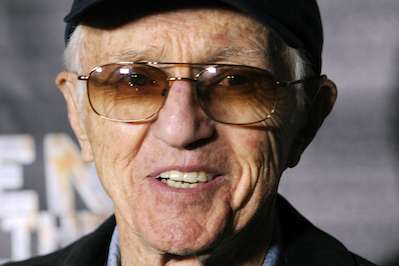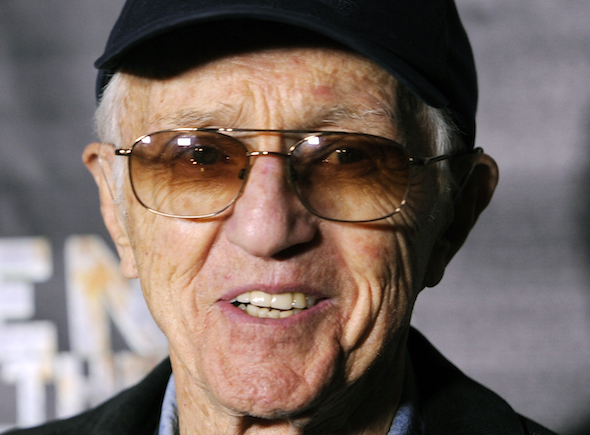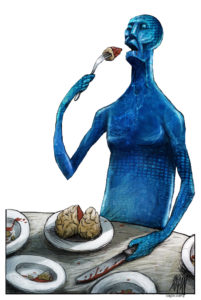Truthdigger of the Week: Cinematographer Haskell Wexler
Despite a privileged childhood, his sensitivity to injustice drew him to make documentaries on topics such as civil rights, radical activism and the Vietnam War. And along the way he won Academy Awards for his work in two commercial films.

Haskell Wexler at a film premiere in Los Angeles in October 2011. (Chris Pizzello / AP)
Every week the Truthdig editorial staff selects a Truthdigger of the Week, a group or person worthy of recognition for speaking truth to power, breaking the story or blowing the whistle. It is not a lifetime achievement award. Rather, we’re looking for newsmakers whose actions in a given week are worth celebrating.
In an age that pressures us to always keep one eye on politics, what could be better for the soul than the artful handling of political themes? Art helps us endure unpleasant truths, a wise person once said. During his 60-year career, cinematographer Haskell Wexler, who died in his sleep Sunday at age 93, helped audiences do just that.
Wexler won Academy Awards for his black-and-white work in the 1966 marital drama “Who’s Afraid of Virginia Woolf?” and for “Bound for Glory,” Hal Ashby’s 1976 dramatization of the life of folk singer Woody Guthrie. Those films delivered a sensibility that many viewers found useful for grappling with questions about themselves, their relationships and the condition of greater society. But Wexler also made documentaries, on subjects spanning civil rights, radical activism, the Vietnam War, the plight of the disenfranchised, torture and international meddling by U.S. officials.
“We have a responsibility to show the public the kinds of truths that they don’t see on the TV news or the Hollywood film,” his obituary in the Los Angeles Times quoted him as saying.
Early in life, his allegiances may have seemed odd. Despite enjoying a childhood funded through the Great Depression by a fortune his father made in the electronics industry, at 17 Wexler organized a strike at his father’s factory. He spent a year at the University of California, Berkeley before he dropped out to join the merchant marine. He ended World War II as a second officer, one who had survived 10 days in a lifeboat with 20 other seamen after their supply ship was torpedoed in the Indian Ocean.
After the war, Wexler set up a small film studio in Des Plaines, Ill., with help from his father. It was a commercial failure, and in 1947 he began working as an assistant cameraman on industrial and educational films. By the late 1950s he had built up an impressive résumé of credits as a cinematographer.
Among his films were “The Thomas Crown Affair,” “In the Heat of the Night,” “Coming Home,” “Colors” and “The Babe.” He received Oscar nominations for “One Flew Over the Cuckoo’s Nest,” “Blaze” and “Matewan,” a film about a bloody strike by coal miners in 1920 in the titular West Virginia town that became a symbol of the struggle for workers rights. Also, Wexler was visual consultant on George Lucas’ 1973 “American Graffiti.”
Wexler’s directorial debut came with “Medium Cool,” a low-budget 1969 film partly shot during 1968’s violence-plagued Democratic National Convention in Chicago. The movie is studied today by film students for its cinéma vérité style, which mixed documentary and drama. At one point, a voice is heard off-camera warning Wexler of a cloud of tear gas: “Look out, Haskell—it’s real!”
Wexler’s evident mettle and sense of injustice were no doubt tangled up with his prickly nature, as several filmmakers attested in a highly personal documentary, “Tell Them Who You Are,” made in 2004 by his son Mark Wexler. He was fired from “Cuckoo’s Nest” more than halfway through shooting because, according to director Milos Forman, “He was sharing his frustrations with the actors.” In his son’s documentary, Wexler said, “As a director of photography, I always have worked as if it’s my film. I don’t think there is a movie that I’ve been on that I wasn’t sure I could direct it better.” Isn’t that an unexchangeable part of the spirit that drives progressive politics?
“His real passion was much larger than just making movies,” the Los Angeles Times quoted his son Jeff Wexler as saying a few hours after his father’s death in Santa Monica. “His real passion was for human beings and justice and peace.” In an interview on “Democracy Now!” two months before his death, Wexler told viewers, “Don’t arbitrarily take the system.”
We won’t, Haskell. Haskell Wexler is our Truthdigger of the Week.
Your support matters…Independent journalism is under threat and overshadowed by heavily funded mainstream media.
You can help level the playing field. Become a member.
Your tax-deductible contribution keeps us digging beneath the headlines to give you thought-provoking, investigative reporting and analysis that unearths what's really happening- without compromise.
Give today to support our courageous, independent journalists.






You need to be a supporter to comment.
There are currently no responses to this article.
Be the first to respond.